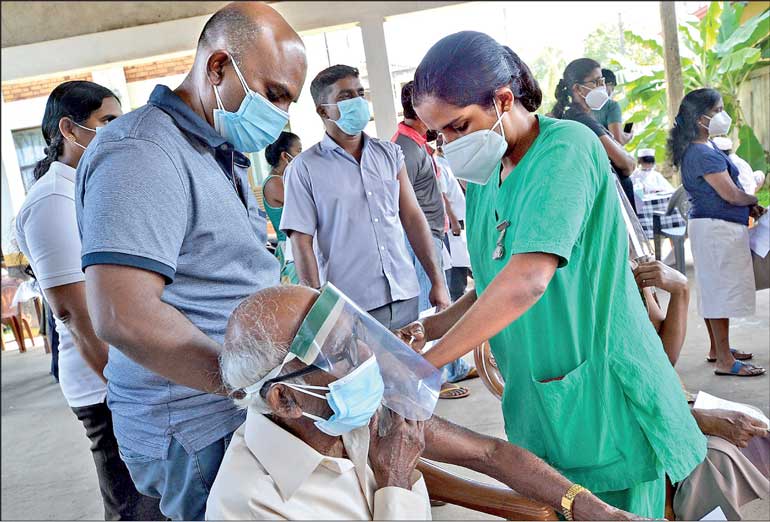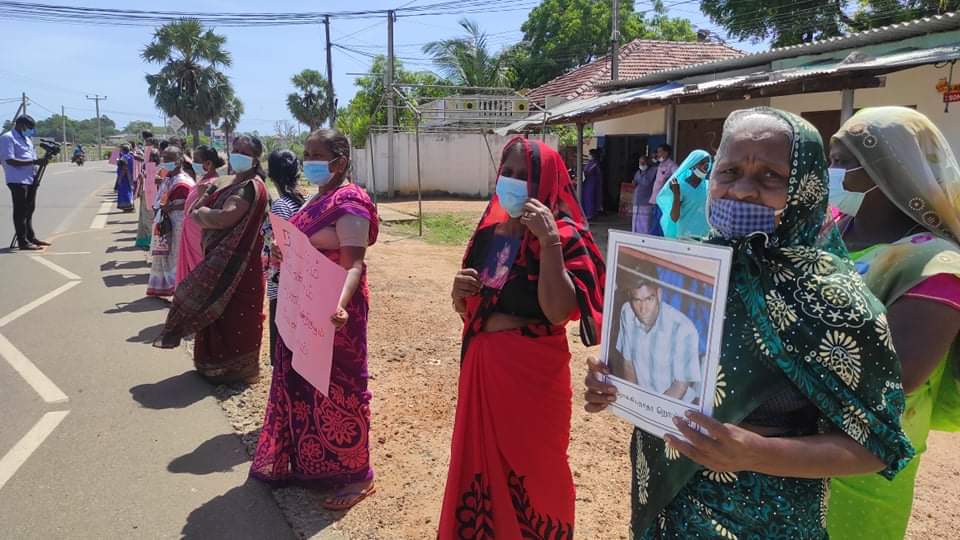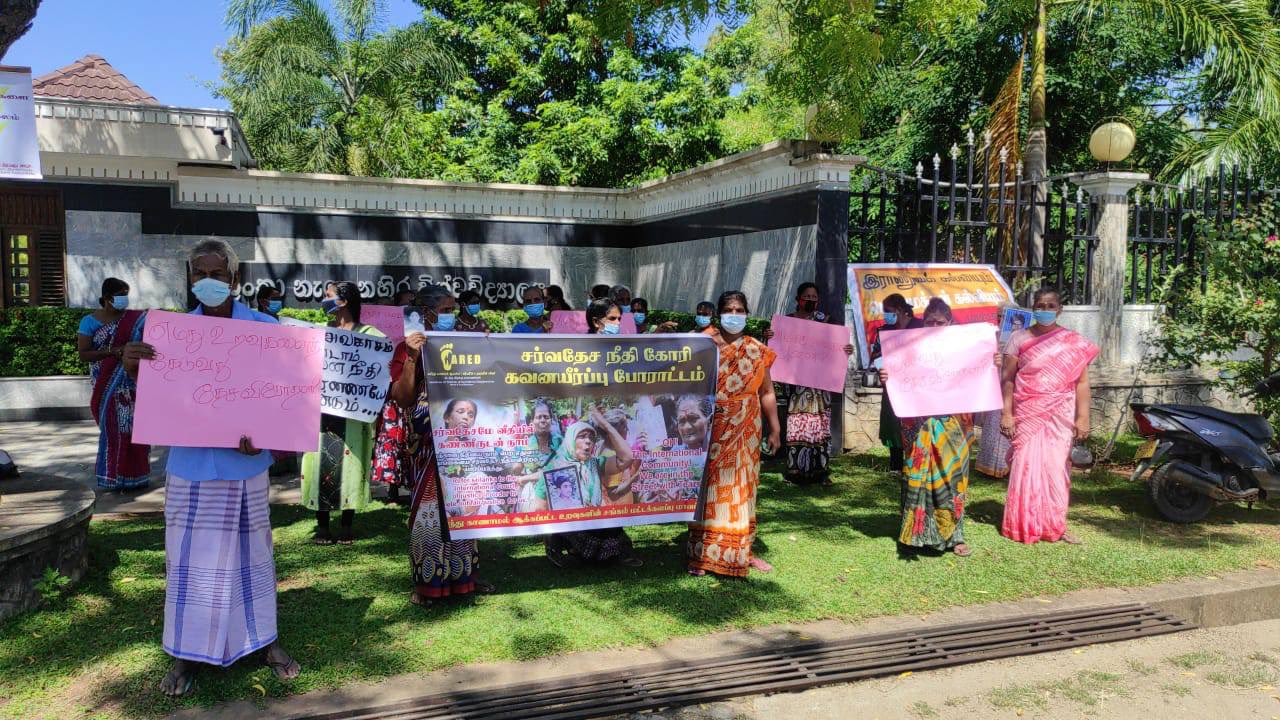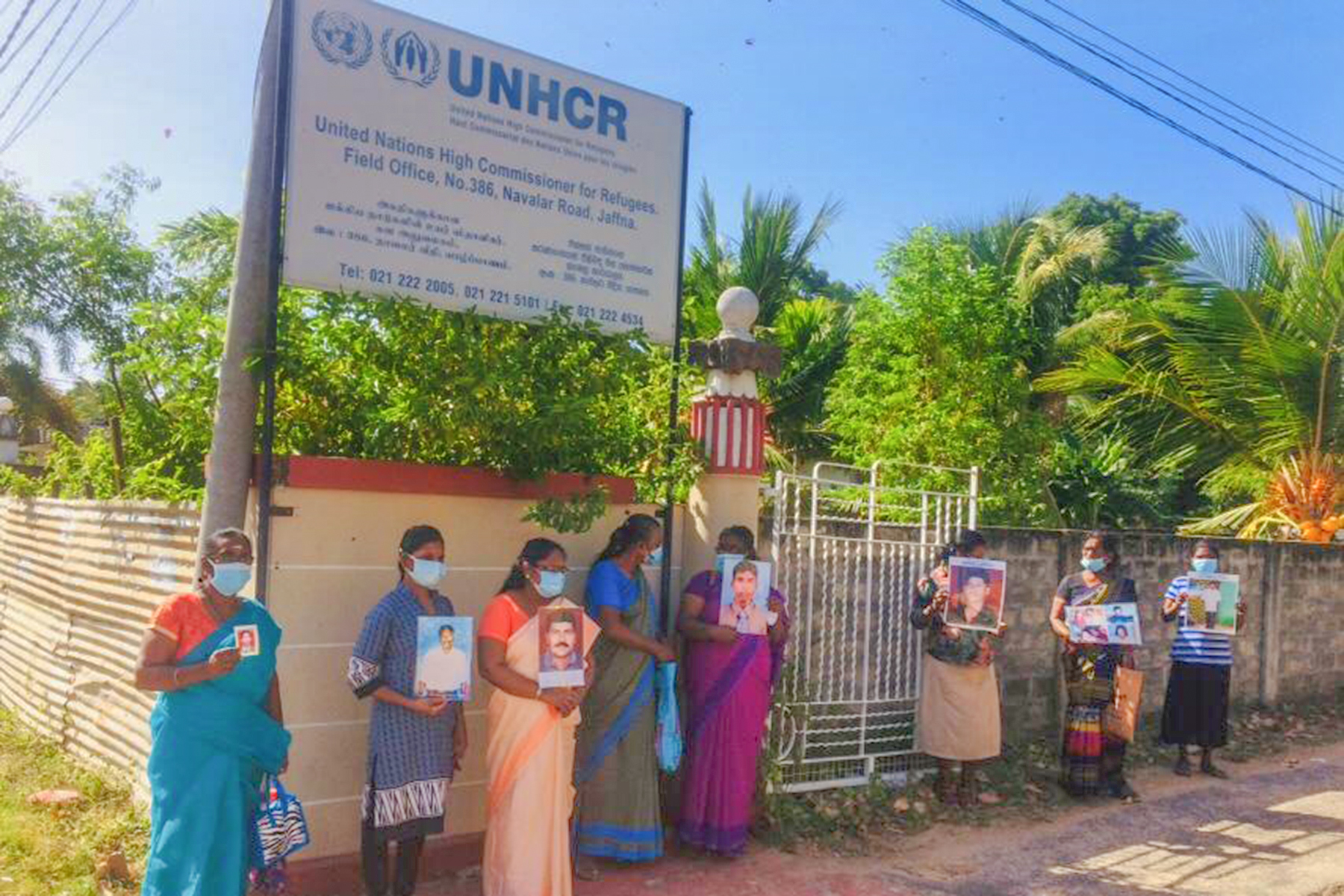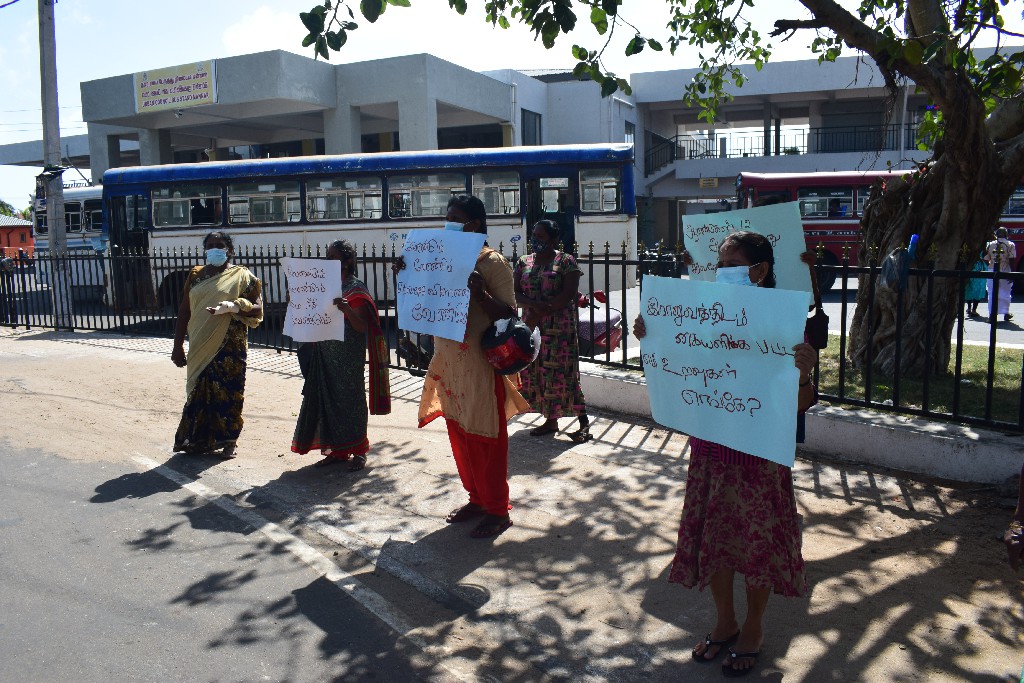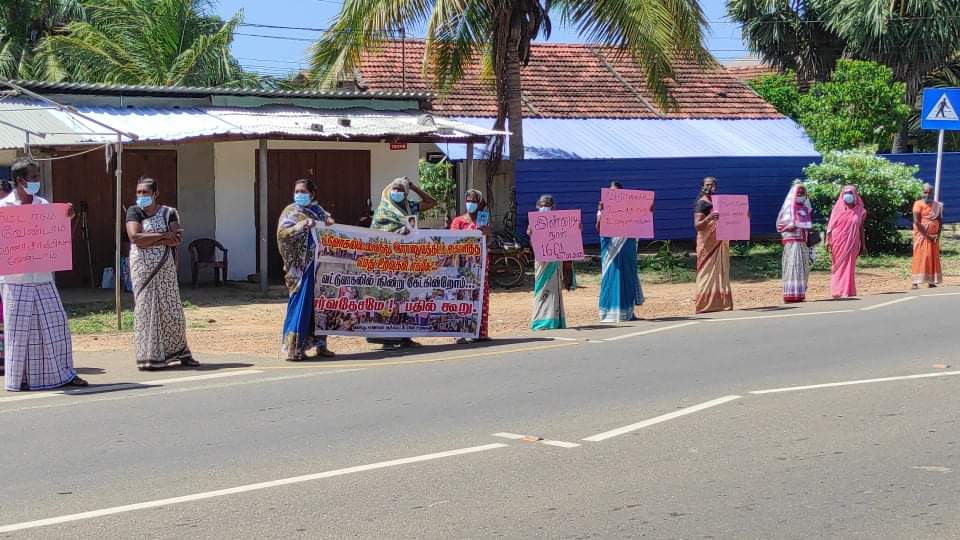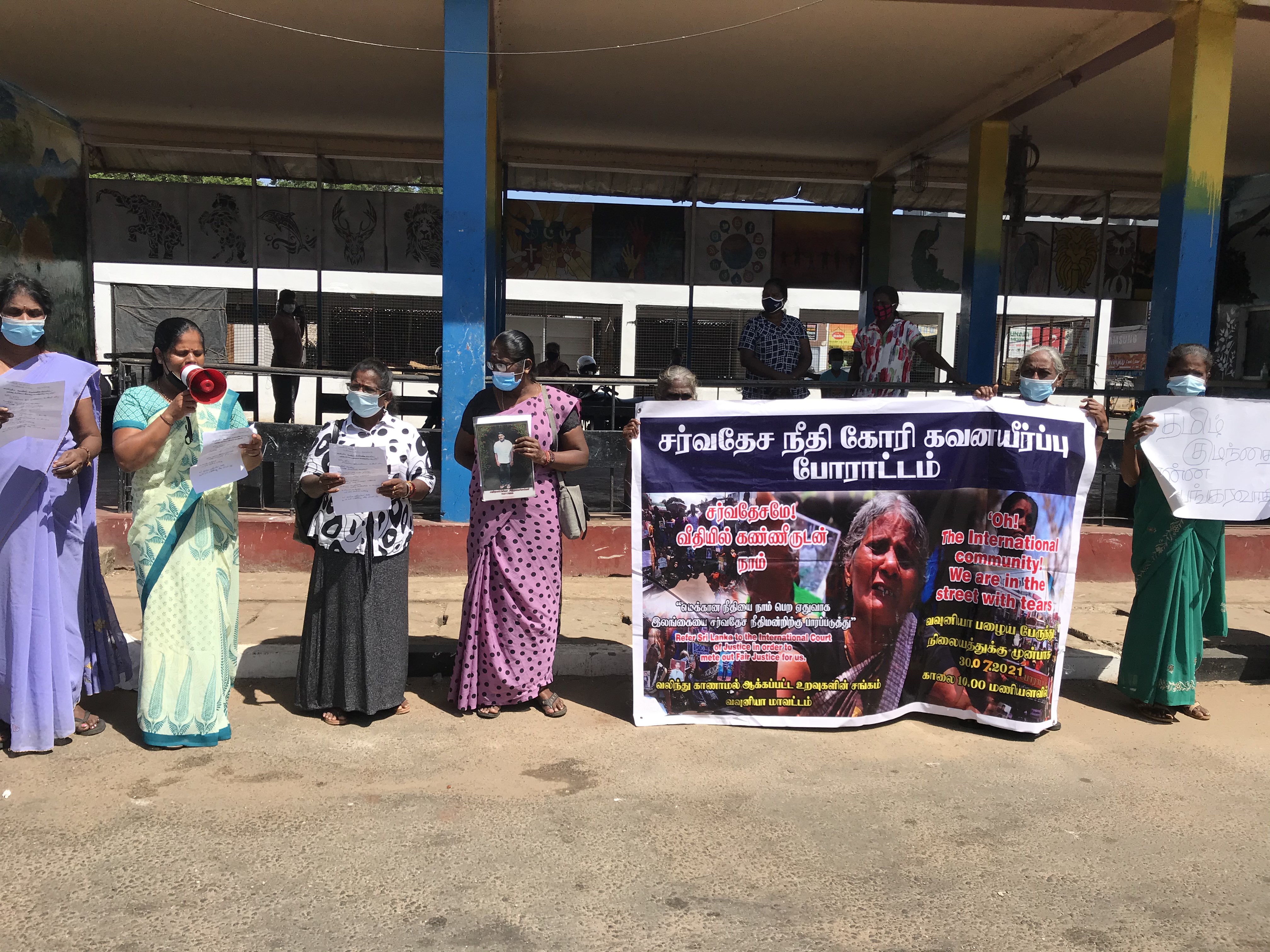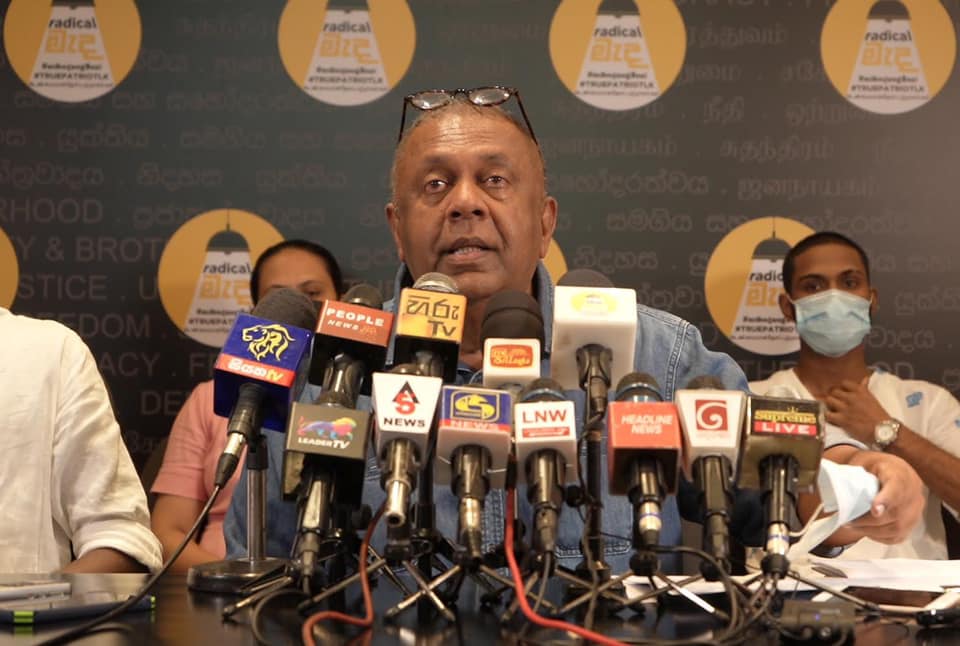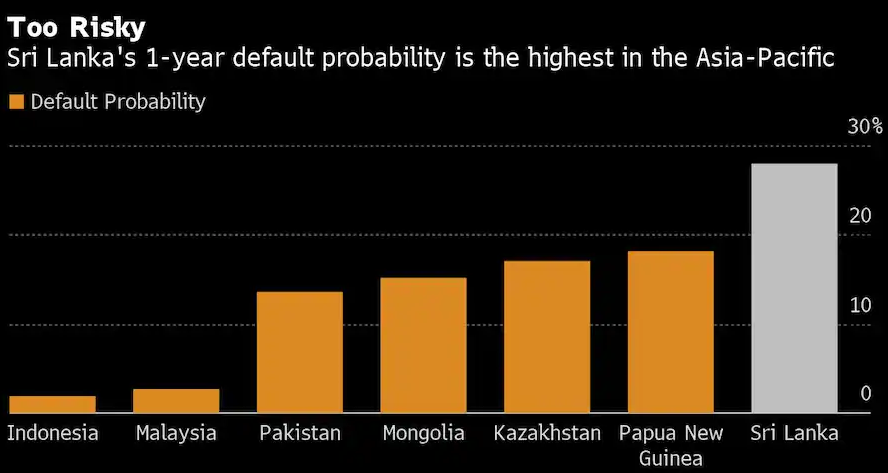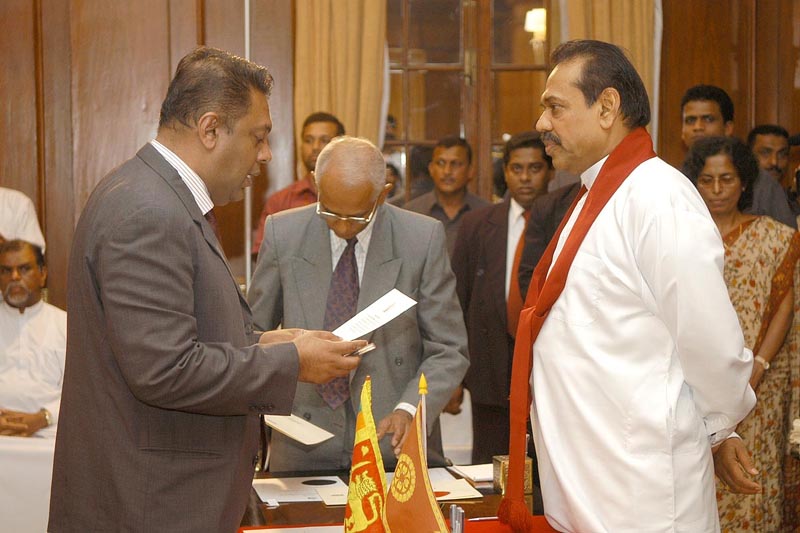Ad hoc tax application, lengthy approval processes are among them
by Kelum Bandara-July 31, 2021U.S. Ambassador Alaina B. Teplitz said lengthy approval processes, ad hoc tax applications and difficulty in obtaining property to build factories or facilitate investments, tax on financial flows and mandatory requirements for converting dollars into rupees remain barriers to investment in Sri Lanka.
During a round-table discussion with journalists, she said she talks to Sri Lankan business people as well as American business people all the time and they continue to express frustration over barriers to investment here.
“I talk to Sri Lankan business people as well as American business people all the time and they continue to express frustration over barriers to investment here. So lengthy approval processes or ad hoc kind of tax application or difficulty in obtaining property to maybe build a factory or facilitate an investment. Even transferring money. Right now there are taxes on financial flows and mandatory requirements to convert dollars to rupees. All of these things can be big barriers to investment when international firms look at global options and Sri Lanka has to fundamentally be in a position to compete not just within the country or even within the region but frankly, globally with other countries that are trying to attract the same investment,” she said.
Transcript of Ambassador Teplitz’s Virtual Media Roundtable with Sri Lankan Journalists
Ambassador Teplitz: Good morning everybody. Thank you, Doug. And thanks to everybody who’s joined today for the roundtable. I really welcome the opportunity to speak. I have met many of you in the past and of course you’ve heard me say in our previous conversations that Sri Lanka and the United States enjoy the benefit of a very long relationship and a long friendship.
However, the last several years, of course, have been tumultuous. A time for both of our countries to take a look at the quality of that relationship and friendship. And I look back and I certainly see that the quality has been good. The United States has responded in times of need for Sri Lanka. We have deepened ties between peoples, whether it’s through business or study, or family connections. We’ve really sought to ensure that that relationship is a two-way street. It’s not one-sided. It’s one where both countries and both peoples can gain value from the partnership.
The tumult, of course, stems from politics, from the brutal and unjustifiable terror attack that took place in Easter 2019 and of course the ongoing pandemic.
And I did want to say an extended word about some of the pandemic-related support that the United States has provided to Sri Lanka. We have supplied more than $8 million to Sri Lanka’s COVID-19 response and recovery. And, of course, many of you would have been tracking the July 15 arrival of more than 1.5 million doses of the Moderna vaccine that came straight from the U.S. national stockpile to Sri Lanka, delivered here through the COVAX mechanism. The vaccines have come at no cost to the people of Sri Lanka, so they are a true donation and in addition to the vaccines we have provided medical equipment and supplies, PPE, ventilators and other support to ensure that Sri Lankan health authorities and people can overcome the challenges posed by this global problem.
The United States is the largest single country donor to the COVAX vaccine distribution mechanism, and we are continuing to provide support not only through that funding but also with vaccines and other items coming from our own stockpiles and we’re very committed to providing access to these high quality and WHO authorized vaccines. So that’s something that I think is of immediate concern to your readership, but it’s really just the kind of help that we have been consistently providing as a long-term development partner. And you can look back to other periods of stress or trauma in Sri Lanka’s history, whether it’s looking at the immediate aftermath of the Easter attacks when we responded to the Sri Lankan government’s request for support for the investigation, or back to 2004 looking at the tsunami, or even earlier in trying to address some of the challenging development needs of the country.
And building on the shared values and strategic interests that our government has, we hope in the future to increase Sri Lanka’s capacity to foster sustainable and inclusive economic growth, counterterrorism and transnational crime, and to promote the rule of law, transparency and democratic governance.
So we want to continue the partnership. We remain committed to the prosperity and the rights of all Sri Lankans and we look forward to many more years of partnership going forward.
With that let me now open the floor for questions.
Moderator: Thank you very much, ma’am. We will begin with the first round of questions and I first call on David Ebert of Derana to ask the first question.
Journalist: Good morning, everyone. My question basically is, I thought I’d get down to some [inaudible] facts early in the morning is related to the human rights situation and the rule of law situation in Sri Lanka. What I’d like to know is how does the U.S. administration view the situation? Is there a change in its stance? Will there be more engagement with the Sri Lankan government on the issue? And in what form will that entail?
Ambassador Teplitz: That’s a very good question and it is an important part of our relationship. As two countries that have democratic political institutions and where we have signed on to international conventions that support human rights and the rule of law. We fundamentally look at Sri Lanka’s human rights commitments as exactly that – Sri Lanka’s commitments to human rights. Our human rights engagement with the government of Sri Lanka is about helping Sri Lanka fulfill those commitments to its people, to the world, and making sure that the highest standards of respect, tolerance and human dignity are in fact in place here.
This is completely consistent, of course, with the sustainable development goal, something that President Rajapaksa has pledged to undertake for the country and that the United States also has supported. So our human rights commitments and engagement here should be understood in that context. This is about Sri Lanka’s journey as much as it’s about the world’s journey to better respect the dignity and rights of every person.
So looking at the context here, of course we continue to talk with the government about challenges to human rights and we note recent actions, for example, the release of prisoners who have been detained, in fact who were arrested, sorry. I think all of them were convicted under the PTA, this was the Poson Poya pardons. That was a really helpful and welcome step forward and I think that we look forward to the effort to look at more people who have been detained under that legislation, legislation that no longer conforms to international norms and does need to be revised.
There are other challenges out there, of course, and I did note that in light of the Supreme Court ruling in 2008 which had upheld the conviction of another one of the pardoned prisoners, Duminda Silva, that didn’t appear to be consistent with SDG goals or maintaining the rule of law.
So we want to continue to engage with the government to ensure that the rights of all citizens are protected and that Sri Lanka’s prosperity and sovereignty remain protected through adherence to these international commitments.
Moderator: Thank you, ma’am.
Now we move on to Kelum Bandara of Daily Mirror.
Journalist: Good morning, Ambassador. Ambassador, I would like to know how the B3World, Build Back Better World program, how do you look forward to cooperate with Sri Lanka under this particular program in the future?
Ambassador Teplitz: Under the what program?
Journalist: B3W, Build Back Better World Program announced by your President.
Ambassador Teplitz: The Build Back Better Work Program. I have to say, perhaps I know that program under a different name so I’m not familiar with that one specifically.
Journalist: I was referring to that B3W program.
Ambassador Teplitz: I’m not sure I know that one. Like I said, I might know it under a different name or some shorthand that we call it.
I’m happy to address some of our commitments around development more generally, if that’s helpful.
Journalist: Of course.
Ambassador Teplitz: Okay. As noted earlier, we remain a really committed partner of Sri Lanka, and part of that partnership has been supporting Sri Lanka on its development journey. And for 60 years, in fact, we have been really focused on that. It’s been a large part of our partnership. The goal, of course, is to ensure that the people of Sri Lanka arrive at a more prosperous place but also are more capable in terms of managing some of the challenges the country may confront, and I’ll offer the example of sort of natural disasters.
We’ve supported the Disaster Management Center and authorities in the Sri Lankan government and across communities and the entire country to better manage the response to floods and landslides, for example. And the people and government of Sri Lanka have become increasingly capable. And in the last several rounds of predicted flooding, Sri Lanka has been able to respond without the need for foreign support and intervention to meet the challenges posed by that natural calamity. That’s exactly the place we want to arrive at, where Sri Lankans are managing everything without the need for support, although given willingly from friends abroad because they’ve got the institutions and the training to make that response happen.
We are focused, of course, also on growing the economy and many of our development projects are in partnership with the private sector, looking at ways to mentor small and medium sized Sri Lankan businesses. Looking at ways to get them access to finance so that they can grow and create jobs for Sri Lankans. Helping mentor and support the existing talent that’s here.
We’ve also spent quite some time and effort focusing on programs to support Sri Lanka’s young people, connecting them to jobs and helping make sure that they get the training that they need to succeed in the workplace.
So these are the types of things that we’re focused on in the development relationship, and it’s all about supporting Sri Lankans to help themselves. We feel that a prosperous Sri Lanka, one where the economy is growing and hopefully growing in an inclusive way, is going to be a great partner for the United States and of course enhance stability in the region and be a great partner for other countries around the world and will be entering those partnerships from a position of strength and capability.
Moderator: Thank you, ma’am.
We will now move to Robert Anthony from Virakesari.
Journalist: Thank you. Good morning, Ambassador. You had negotiation with recently TNA regarding accountability and reconciliation and a permanent political solution. What is the outcome, and how do you see the accountability and reconciliation program or the issues in the country at the moment?
Ambassador Teplitz: Actually I had a meeting with the TNA, not negotiations. I make a point of meeting with all of the political parties including parties in power and the parties in opposition periodically in order to exchange views, so I can understand where they’re coming from and I can share the policies and thoughts from the United States. So I had a very cordial meeting with the TNA and was able to hear from the leadership there about their concerns related to needed changes in the political process and some of the challenges that people in the north and the east in particular, but island-wide are facing with regard to the economy and concerns, frankly, over preservation of civil liberties here, making sure people are free to demonstrate and making sure that people are free to engage in the political process.
The United States has long supported the human rights, the political rights of all people on this island, no matter what community they might come from or represent or what part of the island they might come from or represent. But we do support a Sri Lanka that remains wholly democratic and is united and strong and sovereign. We don’t think any of those things are incompatible.
So there were, like I said, a cordial conversation in a meeting.
Moderator: Thank you ma’am.
We move on to Easwaran Rutnam of Colombo Gazette.
Journalist: Hi, Ambassador, good morning.
I just want to ask you about the Port City since this administration is putting a lot of emphasis on investing on the Port City, and with the Biden administration enforcing sanctions I believe on the company involved with the project.
As far as U.S. investments are concerned, is there an opportunity or does the U.S. prevent U.S. investors from putting their money on the Port City?
Ambassador Teplitz: One of my priorities has been to encourage U.S. investment in Sri Lanka as a whole. Looking at the opportunities that would be here for joint projects and to help the economy grow, and of course continue to strengthen the ties between our countries by encouraging business relationships. Port City obviously is something that’s new on the economic scene here. New legislation, a new opportunity for potential development. The United States does have one of the companies that are working on the Port City development on our sanctions list, I believe, and we can get you I think some more facts about the specifics on that. And so doing business with that company might not be something that’s advisable. And of course companies are going to have to look carefully at the terms of doing business in the Port City going forward and what the legislation means.
I believe the last time I spoke with some of you or a roundtable like this I expressed concern over the Port City legislation. It was then in draft. It’s now been passed. I continue to be concerned about some aspects of that legislation although I’m trying to dig deeper and really understand what it may mean, because there do appear to be openings for either corrupt influences or potential for illicit finance and financial flows, money laundering, and things like that.
U.S. companies are going to be wary of that. They want to keep clean balance sheets, they’re not going to engage with partners that aren’t going to meet international norms in relation to international finance. And of course we have our Foreign Corrupt Practices Act that makes corruption and the payment of bribes in the conduct of business illegal for U.S. firms. So they’re going to have to look very, very carefully at that legislation and what that means in terms of doing business and at any regulations that get promulgated as a result of the legislation.
The U.S. is not preventing American companies from investing but we have been raising concerns about the investment environment for any companies, not just American companies, and whether it’s going to be one that is attractive, and as attractive I think as Sri Lanka wants it to be, needing that foreign investment to help the economy grow.
Moderator: Thank you, ma’am.
On to Shehan from Hiru TV News.
Journalist: Good morning, Ambassador. Taking back [inaudible] with regards to investment and now you touched upon the Port City. Port City has the potential of about $15 billion U.S. dollar investment capacity. You also said that you will not encourage the U.S. companies to invest in Port City. But you also had concerns over the legislation. But now you know that also in your address you pledged that the U.S. will be the financially backing Sri Lanka in terms of the development process especially in the investments.
So how do you basically encourage to mitigate this with the government and to encourage the U.S. investors to invest in Sri Lanka? And with that, there are a lot of concerns about the U.S., are you behind some negotiations with some power plant in Kerawalapitiya to push an U.S. investor to invest in Sri Lanka.
But the people are in darkness, they do not know what’s the real true story about that. Would you enlighten us on that?
Ambassador Teplitz: A lot of things to unpack in your question, but the first thing I want to clarify is I did not say I would not encourage U.S. companies to invest in Port City. What I said is that we are looking at the new legislation and of course we’ll be waiting for regulations that come from that legislation that would then govern the investment environment and that so far we continue to remain concerned about the legal framework because it appears to have loopholes or provisions that would permit the presence of corruption or potential for money laundering.
I realize that the legal framework of Port City is not complete, that there is legislation, but regulations have to come. There are many details that have to be filled in. So we’re mindful of that evolving situation.
What I said was that U.S. companies are not going to want to invest in an environment that has essentially a problematic legal framework. They want to be assured that they’ll be doing business in ways that meet international standards, and of course we also have legal prohibitions against doing businesses in ways that involve corrupt practices.
So let me just clarify that, what I was saying in response to the earlier question.
Then you asked I think how to mitigate maybe some of the problems or negatives there, and then how to encourage investment. So two thoughts on that. And again, encouraging investment and having economic engagement between our two countries is a key priority for me.
How to mitigate some of these problems. Well, the most obvious thing of course is to look at international norms in relation to international business conduct and looking at guidelines that have been established through whether it’s the OECD or looking at the requirements established by the Financial Action Task Force. There are plenty of international norms that can help these benchmarks for Sri Lanka in terms of establishing legislation and encouraging growth in business practices. That’s part of the best way to mitigate that.
Also I think that having a consistent policy regime, one that is fully open to international trade and that’s going to encourage that trade and bring inward investment with a minimum of barriers. And this gets to the ease of doing business. I talk to Sri Lankan business people as well as American business people all the time and they continue to express frustration over barriers to investment here. So lengthy approval processes or ad hoc kind of tax application or a difficulty in obtaining property to maybe build a factory or facilitate an investment. Even transferring money. Right now there are tax on financial flows and mandatory requirements to convert dollars to rupees. All of these things can be big barriers to investment when international firms look at global options, and Sri Lanka has to fundamentally be in a position to compete not just within the country or even within the region but frankly, globally with other countries that are trying to attract the same investment.
I know this is not a new issue. The ease of doing business annual ranking is well known and the government and the senior leadership I know have promised to tackle these challenges and I hope that that can come to pass, that some of the barriers can be removed and the United States remains ready and willing to support the government in removing barriers to investment. Ultimately we’d like to see Sri Lanka have good quality investment, making sures that it’s transparent, that it’s open, that it’s real investment.
And in that regard, you asked me about the New Fortress Energy Project, proposed project. That’s a private sector investment. It is a real investment with an investor coming with their own money, not bringing loans to finance some sort of project. And they are negotiating with the government according to government processes to make that investment. And I would argue hopefully a crucial investment in the energy sector, a sector that desperately needs to add capacity and new technology in order to supply the needs of Sri Lankans and Sri Lanka’s growing economy.
So I hope that can be concluded, and of course we absolutely support having a fair, clear, consistent legal framework. We absolutely support ensuring that business deals are not made around corrupt practices. And then importantly, investment is meeting the highest environmental and labor standards. That’s definitely something that American companies bring to the table as well as innovation and good technology. But I think increasingly we’re all aware that that is not enough. That taking care of the environment and ensuring the safety, the welfare, and frankly the training and education of the workforce are also very important parts of good quality investment.
Moderator: Thank you very much, ma’am.
We can open up for follow-up questions. First I have David Ebert from Derana.
Journalist: Ambassador, recently the Central Bank announced plans to permit individuals to repatriate what they termed previously undisclosed income into Sri Lanka, that is to shore up Sri Lanka’s dollar reserves. How concerned is the U.S. about decisions like this from a money laundering perspective?
Ambassador Teplitz: That’s a really good question. I know there has been a lot of kind of commentary in the media about the wisdom of the tax amnesty or whatever you want to call this proposal, and I would have to agree that in general this kind of offer doesn’t work in the way people think.
The first problem, of course, is that it’s an open invitation to people to launder money maybe that was obtained in ways it shouldn’t have been and has been stashed abroad, and now they have a chance to bring it in and basically clean it by bringing it into the country under that amnesty. But secondly, it usually doesn’t raise a lot of money for the government at the end of the day. It doesn’t necessarily help. And of course there’s always the possibility that it deters other people in the future from declaring their income because they’ll just wait for another amnesty, right? It encourages them to engage in that kind of practice where every couple of years they can bring their money in and out.
So it’s not the kind of economic choice or policy decision I would advocate. And I think the government really does have a challenge at the moment. You mentioned levels of reserves and just broadly stated I would say there are a lot of concerns about the health of the economy right now. And I think that the solution in the end is not this kind of policy choice. It’s not limited repatriations of funds. A much more massive infusion of funding and economic reform is required and that means going to the International Monetary Fund.
Sri Lanka is a member of the International Monetary Fund. It’s absolutely right to seek the support of the funds. That’s something that the U.S. government would support Sri Lanka doing and support other governments in doing. That’s the purpose of the fund is to help countries that are in need in this way.
I have no doubt that the IMF would work with the government transparently and reasonably to establish appropriate conditions for that kind of support, and that that would benefit Sri Lanka in the long run. There are, I’m sure, economic reforms that are going to be needed in order to strengthen and stabilize the economy going forward. People should welcome that because it’s only going to benefit individuals as well as business to have a strong and stable economy.
Moderator: Thank you, ma’am.
I have Easwaran Rutnam from Colombo Gazette with a follow-up.
Journalist: Ambassador, I just want to ask you, you met the new Finance Minister Basil Rajapaksa soon after he took office. I’m just wondering at your meeting, during your meeting with him if there were signs of promise as far as Sri Lanka’s trade relations are concerned and economic policies that you expect from Sri Lanka.
Ambassador Teplitz: Good question. I had, again, a cordial meeting and conversation with the Minster who is new in that role but obviously very familiar with Sri Lanka’s economic needs.
We did discuss trade relationships and of course I’d refer you to the Minister, but I certainly came away with the impression that there’s a desire to strengthen those relationships and an acknowledgement of what might need to be done to shore that up. Not just with the United States but with other nations. I’d note the GSP+ challenges and the need for the government to engage in that process. And also looking at ways to maybe diversify the trade agenda as well. For my part, I think that would be healthy, looking at ways to encourage investment or trade in non-traditional sectors. A lot of our trade has been focused on apparel and while I actually think quite highly of the apparel industry in Sri Lanka, it’s unique maybe in the world, to have gone way beyond manufacturing and working on design and logistics and has very strong global partnerships. In fact it’s kind of a model for the industry in other parts of the country.
I do think there’s other potential in other industries, whether it’s technology or energy as we were discussing, and those are things that we hope we can maybe explore going forward.
Moderator: Thank you, ma’am.
Robert Anthony from Virakesari.
Journalist: Thank you, madam.
Ambassador, the three member panel or commission appointed by the President to look into the previous commission’s recommendations regarding these accountability issues. The Government is saying that it will engage in the accountability process with the domestic legal framework. How do you see that? And what is the present situation of the Geneva resolution 46/1?
Ambassador Teplitz: Let me just start off by saying that respect for human rights is an enduring American value and enduring policy priority for us. President Biden has articulated a vision for the United States and the world, frankly, where people can live in dignity and importantly without fear. And assuredly where there’s justice and accountability not only with respect to maybe specific events such as the conflict in Sri Lanka but globally on an everyday basis. That there is an end to impunity and that people’s rights and their civil liberties are respected and people have equal and equitable access to justice.
So in that context the PCOI that was established to look at the previous commission’s work, I mean I understand that they have put forward an interim report. The government has not briefed the international community on the findings of that commission or their work to date. That’s something, of course, that I would welcome hearing more about. I have said to government leadership in the past, that we do encourage the government of Sri Lanka to look at some of those previous commissions and their recommendations. The LLRC, for example, that was convened under former President Mahinda Rajapaksa’s tenure, did come forward with some very I think useful recommendations that if the government chose to pursue would do a lot to upholding its commitments both in Geneva and just broadly speaking, commitments to people of this island.
So I think there’s potential there. I’d welcome getting that brief.
And with regard to Geneva more specifically, the current resolution, I believe there’s a review in September to encourage the government to come up with that domestic mechanism and to share what that’s going to be with the international community. Again, potentially referring to some of these previous recommendations.
But to be clear on what that mechanism is going to be, there are many issues to be addressed and concrete steps to address them will build credibility in the international system and I think make the Geneva process one that is less contentious and a much more positive one. And some of these steps could be, for example, replacement or amendment of the PTA. This has been a promise including of this government. I understand there’s an effort underway to do that. But doing that sooner rather than later would be a real sign of genuine commitment to the human rights values that we’ve been talking about. Particularly since this government has used the PTA to detain people and that some of those people, Hejaaz Hizbullah and Jazeem the poet, haven’t had a trial. They’ve been in detention for a long time. And Hejaaz Hizbullah is now an Amnesty prisoner of conscience. So that isn’t a credit really to the government’s statements about a commitment. We need to see that there’s actually some genuine follow-through. And as I noted earlier, the United States is ready to stand by and support the government and do what we can to help it meet those commitments, but there needs to be some action on its part.
I think other things that could be done that would build credibility would be, of course, ensuring independence of institutions like the Office of Missing Persons or of Reparations and ensuring that the leadership of those offices is constituted by people of integrity who are widely respected by all communities and who can ensure that those institutions fulfill their missions.
Their work is still needed. Notwithstanding, of course, the long civil conflict that ended in 2009, there were other periods in Sri Lanka’s history that generated missing family members and those families, the survivors, need some sort of answers about what’s happened to their loved ones.
Likewise, families have been impacted and their livelihoods have been challenged due to conflict and due to the absence of family members, and they need help and support. These needs are still out there and they transcend any one particular group. There are needs all across the island. The government could fulfill the mission of these once independent institutions, make them independent again and ensure the leadership is going to move ahead.
Just two examples of some of the concrete steps that could be taken to make the Geneva process a much more positive one. And to support the commitments that Sri Lanka has made, whether it’s through implementation of the SDGs or its ratification of international conventions to human rights.
Moderator: Thank you, Ma’am.
Next is Shehan Baranage from Hiru TV.
Journalist: Ambassador, in your initial comments you made reference to the special presidential pardons that were given. But it’s very unfortunate, Ambassador, that you have been basically speaking only one story about the release of…talking about the special Presidential Pardon that was given, you were only picking up one incident of a release of a former MP. We have seen there are a lot of politicized issues behind that issue as well. But also you have basically overlooked that there were so many former LTTE-ers who were released by the presidential pardon. Your President in U.S. has also given pardons to thousands and thousands of people. And then we see this. You are speaking of one single case and overlooking the release of LTTE-ers by the government. What led you to do this, Ambassador? Don’t you think this is not totally in the purview of your mandate? Thank you.
Ambassador Teplitz: I think if you look at the transcript of this conversation you will find that I noted the release of people who had been arrested under the PTA, the former LTTE-ers and commended that pardon. I think it was 17 or 19 individuals that were released. That was a very good step forward. I noted that in public in a tweet as well, immediately following the pardon, and I will reiterate again, that that was a positive action and in fact I encouraged the government to continue its review, which it said that it’s doing, of people who have been detained under the PTA to either have a trial and conclude the case or dismiss charges or whatever is appropriate to ensure that people have a fair and transparent processing of their case. And a timely processing of their case given that many of the PTA detainees have been in prison for quite some time. Years and years if not decades. And possibly way beyond what any sentence might have been imposed for the crimes to which they’re accused. So that’s addressing the first part of your question there.
Secondly, it is the prerogative of the President of Sri Lanka, just as it’s the prerogative of the President of the United States, they have pardon powers and they exercise them. It is also my prerogative as a representative of the United States to express the views and the policy concerns of my country and that’s my job as it is of every other diplomat who’s represented here in Sri Lanka.
So I try to do that faithfully, both privately and in public and ensure that the issues that are of concern to us, that it is known where we stand on those issues.
As I said in the earlier statement, not only does the United States consider the promotion of human rights an important part of our foreign policy, but of course as a democratic society, we consider rule of law to be an essential pillar of our form of government. Sri Lanka is also a democracy, South Asia’s oldest democracy with a long and proud democratic tradition. Rule of law is a pillar of Sri Lanka’s government and its commitment to the people. It’s incredibly important and ensuring that rule of law is strong, that people have equal access to transparent and prompt justice is something I would think that most Sri Lankans also want. I know in general there’s a large problem with many people not just people who have been detained under the PTA but people who have been arrested for other types of charges who have been held in remand for very, very long periods of time without actually having a trial. This is the kind of justice reform that I think Sri Lankans and I understand the Justice Minister support, making sure that people get a fair shake in the trial process.
Moderator: Thank you, Ma’am.
We will now have one final question and then we will close the roundtable. I see David Ebert from Derana had his hand raised.
Journalist: Thank you for that.
Going back to the International Monetary Fund, Ambassador, the Central Bank recently said that it will not seek a new program in the near future, and this is because they cite concerns regarding conditionalities such as maintaining a devalued rupee level that is to strengthen exports. But the Central Bank is adamant that alternative methods may work in easing for example the cost of living pressure on the people.
What are your thoughts on that? Is that something that could work?
Ambassador Teplitz: Sri Lanka’s economy is experiencing problems. I think if you ask people on the street they will talk to you about concern over rising food prices and other commodities. They will talk to you about concerns about their jobs in the future. And the state of the economy is due to both policy choices and some of the external shocks like the pandemic for example or the Easter attack that nobody could have anticipated.
I doubt at this point that alternative measures are going to achieve the foundational economic reform that’s going to be required for the economy to regain its health and to grow at an accelerated pace going forward without the support of the IMF. And frankly, some of the collaboration that can be achieved between the government and the IMF to look at some of the economic reforms that are going to be needed.
Sure, it’s possible that Sri Lanka can muddle through. We’ve seen other analysts express that thought. These opinion pieces have appeared in the pages of your news outlets or people have expressed themselves on your TV shows. But I’m not sure that’s what the people of Sri Lanka are going to want, an economy that’s always muddling through.
From the perspective of the United States having good, strong economic policies in place that again, facilitate business and help ensure that the economy is growing on a fair, transparent and inclusive basis and in ways that limit corruption and limit opportunities for illicit transactions is the only way to grow that strong economy of the future. Economies don’t – people don’t prosper by muddling through. You prosper by having a really sound foundation on which to build.
So I know that the leadership at the Central Bank and leadership in government of course are very attuned to the challenges that the economy is posing today and I continue to encourage them to look to the IMF as a central part of the economic solution going forward. And to embrace some of the conditionality as a means of helping build that strong economic foundation.
I thought it might be useful to sum a little bit of this up. It’s not in response to any particular question.
Just to say, many of the questions have focused, of course, on the nature of the relationship and thoughts about things that are happening here in Sri Lanka. But I do want to reiterate a key point which is that the United States does support a secure, prosperous and united Sri Lanka. We are a willing partner insofar as the government and people of Sri Lanka remain committed to democratic values and norms that we share, and we have been a willing partner for decades prior to this. We look forward to continued partnership going forward.
We feel that a reconciled Sri Lanka can overcome any disunity and achieve broad-based equitable economic growth and ultimately emerge as a more developed and more secure partner for the United States. And I think importantly also as a deliverer of prosperity and calm to the people of this beautiful island.
We didn’t have a chance to talk about less weighty issues but I have very much appreciated being in such a special place and I think we were able to maybe hint a little bit in some of the questions at the strong people-to-people ties that I think are a very important foundation of our national relationships and our enduring partnership. What a beautiful island. What a great cuisine. What a lovely place to come and engage. So I certainly want nothing but the best for the people and the country.
And in light of that challenging last couple of years, we remain committed to finding ways to work together even when the conversations are difficult because we do think that there’s much potential in that relationship and that as two democratic countries we have the opportunity to see both of our peoples prosper in a free and open Indo-Pacific environment in a free and open world.
So thank you. Just to put things up in a nice package.
Thanks everybody.
